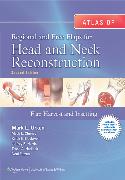|
|
|
| |
 |
|
|

|
 推薦指數:
推薦指數:





|
|
- 內容介紹
|
Atlas of Regional and Free Flaps for Head and Neck Reconstruction
Flap Harvest and Insetting
Author(s): Mark L Urken MD, FACS Mack L Cheney MD, FACS Keith E Blackwell MD Jeffrey R Harris MD Tessa A Hadlock MD Neal Futran MD, DMD
Availability: IN STOCK
Format: Book
Edition: Second
ISBN/ISSN: 9781605479729
2012
This Atlas depicts in a clear manner the use of regional skin, muscle and musculocutaneous flaps as well as donor sites from distant regions of the body where vascularized skin, muscle, bone, and nerves can be harvested and transferred to the head and neck. Otolaryngologists, plastic surgeons and general surgeons use both regional and free flaps to reconstruct damage to the head and neck caused by cancer and trauma. This Atlas provides the surgeon with techniques for mastering different donor sites needed to find solutions to virtually every reconstruction problem. It provides detailed descriptions of the anatomy and harvesting techniques of the major regional and free-flap donor sites currently employed in head and neck reconstruction.
--NEW Add chapters on submental flap, ulnar forearm flap, anterolateral thigh flap, paramedian forehead flap, cervicofacial advancement flap, perforator flaps
--NEW Add harvest of the coronoid process to the temporalis chapter
--NEW Add harvest of the osteocutaneous radial forearm flap to the radial forearm flap chapter
--NEW Add harvest of the scalp to the chapter on temporoparietal fascial flap
--NEW Add harvest of the scapular tip for use in palatomaxillary reconstruction to the scapular flap chapter
--NEW Add to harvest of the IMA and IMV recipient vessels and harvest of the TAC system of vessels to the recipient vessel chapter
--NEW Add to harvest of the IMA and IMV recipient vessels and harvest of the TAC system of vessels to the recipient vessel chapter
--NEW Demonstrate flap insetting and design for a number of reconstructions
--NEW Eliminate chapters on lateral thigh and masseter muscle flaps
--Beautiful four-color line drawings of harvesting of all flaps
--Full discussion of the anatomy, flap design and utilization, anatomic variations, preoperative and postoperative care, potential pitfalls and harvesting techniques for each donor site
--Uses fresh cadaver dissections to provide the most realistic portrayal of step-by-step detail that gives the resident and attending surgeon a thorough understanding of each donor site
|
|
|

